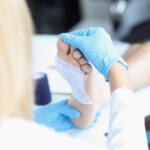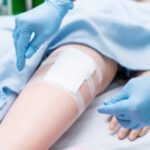How can diet influence the wound-healing process?

Good nutrition is necessary to keep our bodies in excellent health and help them cope with a variety of problems. In the event of injury, a balanced diet is strongly recommended to speed up healing and avoid possible infections.
Important nutrients for wound healing
Vitamins and wound healing
Vitamins are essential to the healing process. Among them, vitamin C is important for the formation of collagen, a protein crucial to skin tissue repair. Vitamin C deficiency can lead to slow healing and an increased risk of wound infection. Foods rich in vitamin C include citrus fruits, strawberries, peppers and broccoli.
Vitamin A helps maintain healthy skin and promotes the formation of new tissue. It also helps improve the immune system, reducing the risk of infection. Key sources of vitamin A include carrots, spinach and sweet potatoes.
Zinc and its role in wound healing
Zinc is a mineral that plays an important role in wound healing. It promotes protein synthesis and cell division, two processes actively involved in tissue repair.
Zinc deficiency can slow healing and increase the risk of complications. To incorporate zinc into the diet, we recommend foods such as lean meats, nuts, seeds and legumes.
Proteins and their importance
Proteins are the building blocks of our bodies, and are particularly important for wound healing. They are needed to form new cells and repair damaged tissue. A protein-rich diet can speed up the healing process.
The best-known protein sources are meat, fish, eggs, dairy products, legumes and nuts.
Foods to avoid for better healing
Fatty and sweet foods
A diet rich in saturated fats and sugars can lead to inflammation, which can slow wound healing. In addition to inflammation, sugar can weaken the immune system, increasing the risk of infection.
In the event of a more or less serious injury, we recommend limiting consumption of processed foods, sweets and fast food.
Alcohol and caffeine
Like saturated fats and sugar, excessive alcohol and caffeine consumption can slow wound healing. Alcohol can interfere with the body's ability to absorb essential nutrients, while caffeine leads to dehydration, which can have a negative impact on skin health and the healing process.
The phases of healing and the importance of nutrition
The inflammatory phase
The first phase of healing is the inflammatory phase, during which the body reacts to the wound by sending out inflammatory cells to cleanse the area.
During this stage, it's advisable to eat a diet rich in antioxidants to help reduce inflammation and support the immune system. Colorful fruits and vegetables, such as berries, spinach and peppers, are excellent sources of antioxidants.
The proliferation phase
The proliferation phase follows the inflammatory phase and is characterized by the formation of new tissue. An excellent supply of protein, vitamins A and C, and zinc is needed to support collagen and new tissue formation.
A balanced diet with varied sources of these nutrients can greatly help during this stage.
The ripening phase
The final phase of healing is the maturation phase, during which tissues strengthen and remodel. During this stage, a nutrient-rich diet must be maintained to promote the formation of strong tissue and prevent hypertrophic scarring.
Omega-3 fatty acids, found in oily fish like salmon and chia seeds, can help reduce inflammation and support skin health.
The healing benefits of photobiomodulation
Photobiomodulation (PBM) is a technology that uses light at specific wavelengths to stimulate cells. The process is known for its wound-healing benefits.
One of the main benefits of photobiomodulation is its ability to accelerate tissue repair. Light penetrates tissue and stimulates cells to produce more energy in the form of ATP (adenosine triphosphate). This increase in cellular energy enables cells to function more efficiently and repair themselves more rapidly. The result is a reduction in the time needed for wounds to heal.





